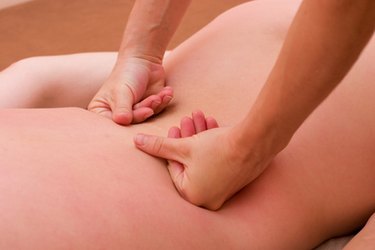
Ligaments are fibrous tissues that connect two bones to enhance joint stability. When a ligament is strained, the aftereffects include sharp pain, swelling and an inability to move the joint. There are a variety of treatment options depending on how severely you strained the ligament. Mild tears or sprains are treated with ice, medication and physical therapy, but severe sprains may require surgery.
Step 1
Apply ice to the strained ligament to alleviate pain and swelling. Ice helps the torn ligament to heal more quickly. It works by constricting blood vessels surrounding the injury, so that swelling and inflammation is reduced. Ice also numbs the nerves to reduce pain. It must be applied to the affected area for 20 to 30 minutes at a time, three to four times a day, according to the American Academy of Orthopedic Surgeons.
Video of the Day
Step 2
Use nonsteroidal anti-inflammatory drugs, NSAIDs, to repair strained ligaments. These medications hinder chemical signals that exacerbate pain and swelling. By reducing pain, the patient can engage in therapeutic exercises that speed up healing. Getting the swelling under control also helps the body heal the strained ligament.
Step 3
Engage in physical therapy once swelling and pain has decreased. Physical therapy improves the injured joint's strength and range of motion. It may also reduce the likelihood of re-injury to the affected area. A therapist will teach you exercises to be performed in a clinical setting as well as some you can do at home.
Step 4
Get surgery if the ligament is severely torn. A surgeon must reattach the ligament to bone and get rid of damaged fibers around the ligament to ensure proper healing. If there is any other structural damage in the joint, he will repair this as well. Discuss the advantages and risks of surgery before proceeding with the process.
Video of the Day
Is this an emergency? If you are experiencing serious medical symptoms, please see the National Library of Medicine’s list of signs you need emergency medical attention or call 911.